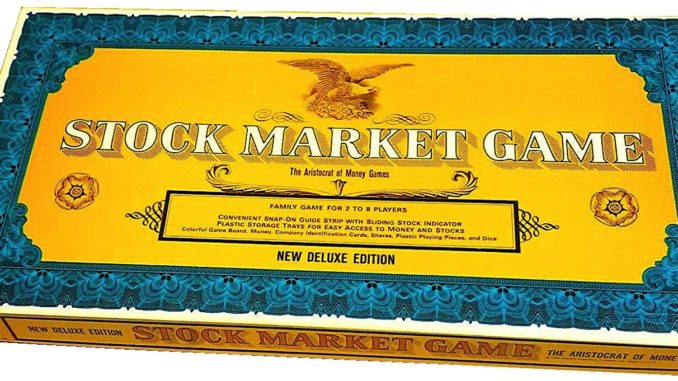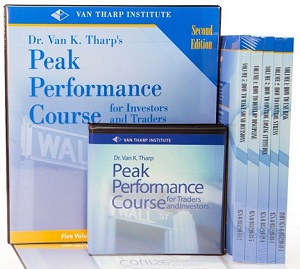
Your Game, Your Rules: Winning Your Trading Game By Van Tharp Trading Institute
We all play “Games” in different areas of our lives. There is the game of work that follows certain rules for moving up the career ladder. There is the education game we follow to earn good marks to then get a good job. There is also a wealth game, a health game, a politics game, etc.
The capital markets are no different. Markets represent a big trading game with some players winning huge amounts of money and others losing huge amounts. How do you position yourself to best benefit from this game? How do you play to win your game within the bigger game?
Whose Game are You Playing?
Every game follows certain rules and those who make the rules control the game to their advantage. Just imagine: If you could set up the rules of a game that everybody else had to follow, wouldn’t you do it for your benefit?
We all play “Games” in different areas of our lives. There is the game of work that follows certain rules for moving up the career ladder. There is the education game we follow to earn good marks to then get a good job. There is also a wealth game, a health game, a politics game, etc.
The capital markets are no different. Markets represent a big trading game with some players winning huge amounts of money and others losing huge amounts. How do you position yourself to best benefit from this game? How do you play to win your game within the bigger game?
The capital markets are an example of an infinite game that is never supposed to end, bringing in new players over time. This aspect is crucial to understand, as you and others probably came into the game as unprepared traders. Realize that the rules of the capital markets are set up for the new small trader (you!) to lose!
The rules of the bigger game motivate you to jump right into the live markets, taking many trades, without using a trading system. New traders shoot at anything that moves and trade the markets around the clock so as not to miss out. Doing this, however, causes you to think you are constantly missing the good trades and good profits. You probably feel confused and
overwhelmed. As you grow more and more stressed, your self-esteem drops away and your trading losses grow. Besides encouraging a poor mental state, your trading is not a winning game! You are likely making consistent losses that will force you to exit the trading game at some point.
Thus, why don’t you stop and think: Whose game are you playing?
In contrast, you could be “in control” with rules that help you make consistent trading results. You could play a winning version of the trading game where you feel good and strong about yourself.
How can you tell if you are playing your winning game when you are trading well? You will feel the 3 C’s – Cool, Calm, and Confident.
Steps to Win Your Game
Now I am well aware that playing your winning game is easier said than done – but there are a few simple steps you can take. The following four steps are the major contributors in a structured growth process I developed for traders to move up their personal trader development path.
First, find or develop a few trading systems that fit you. If a system fits you, you will be able to execute the rules flawlessly after you have put in some focused practice time. You can accelerate this process of learning a system’s rules by following the principles of Deep Practice using a trading simulator. For more details, read my previously published article, Deliberate Practice Helps You In Achieving Trading Mastery.
Second, define your personal trading game. After you have learned to execute your rules flawlessly, you can then move up a level to establish the rules of your personal trading game, stacking up the probabilities for you to win. As a starting point, think about what timeframes you want to trade, how do you incorporate trading into your life/work schedule, is trading with alarms more suitable for you than with pre-set trade orders, do you need a fully automated stop trail taking care of your open positions, what is your weekly R-goal and what do you do once this is achieved? Once your trading game is defined and implemented, learn to follow your rules efficiently while you are executing your trading system flawlessly. In this step, you will progress from simulated trading to demo account trading to finally trading the live markets with a real money account. This step takes some time, but you can easily track your progress as you move forward.
Third, establish your live trading process. This will be your daily/weekly/monthly process for trading the live markets. As you build your winning process, it will support you in generating a stream of good trades from several systems with an overall positive expectancy to reach your weekly and monthly R-goal For more details, read my previously published article, Good System Relies On A Robust Trading Process. The same way you do not bridle a horse from behind, you cannot expect winning trades consistently from the very beginning – although most traders do expect that.
To sum the individual steps up, the order of progression is:
(a) Find a few trading systems that fit you.
(b) Learn to flawlessly execute that system by applying deep practice.
(c) Define your personal trading game that makes you win the game.
(d) Establish your live trading process and make it efficient.
(e) Take winning trades as you flawlessly execute your trading game.
Once these steps are mastered, the fourth step then involves the trader moving even further up their trader development path by becoming an Independent Trader, following a unique trading style For more details, read my previously published article, Three Keys to Reaching Your Full Trader Potential.
Four Winning Trader Games
Everybody’s trading game is different, even when different traders use the same systems. Different traders will slightly adapt and trade the same system according to their individual skills, circumstances, and preferences.
Below are some examples of very successful traders who have recently completed their trader development path after attending my workshop. All of them became mature traders (reaching expert stage and higher) within 6-8 months after completing my course. They have all developed into Independent Traders executing their personal trading game profitably. I am very proud of them.
Trader 1: Full-time trading short timeframes
Wojtek, from Poland, attended the Futures Trading Systems Workshop last fall and found his passion trading very short timeframes—charts with 5-second, 15-second, 1-minute, and 5-minute bars. Having been a complete trading novice before the workshop, he has very quickly become a mature trader. Within less than 6 months he was able to consistently outperform his weekly R-goal executing his game. He now trades the market full-time.
Trader 2: Part-time trading after a full day of work
Jamie is a full-time practicing medical doctor in Australia. He trades both Futures and Forex after work for about 1-1½ hours per day, 3-4 days per week. This is all that his busy schedule allows him to do. He trades the lower and medium timeframes (1, 5, 15, 60, and 240-minute charts). Despite his limited time available for trading, he regularly generates +20R to +25R per week. In this last week (August 15-21, 2021), Jamie generated an astounding +63R result.
Trader 3: Full-time trading the higher timeframe swings
Rui lives in California and trades full-time in both the Futures and Forex markets. She has many interests and responsibilities in her life so she decided to trade higher timeframes (mainly 60-minute charts) with the goal to transition them into long-term swing trades. She has generated some breathtaking results holding, for example, long positions in gold and silver for several months using System 1 and System 2 with double-digit R-multiple gains. From her own trading experience, Rui has coined the term “cool, calm and confident”. In this 9-minute video, Rui talks about her experience developing as a trader and her winning version of the Trading Game.
Trader 4: Part-time trading the markets as a 3rd business
Steve is a successful entrepreneur in the US. He loves trading but treats it as one of his businesses, actually, his third business. Steve allocates about 3 hours per day to trade the Futures markets and prefers to trade medium to longer timeframes—60-minute bars and higher. Steve was profitable from the time he started trading the live markets.
Start Where You Are
Where are you right now in relation to perceiving trading as a game?
Did you even know about the markets game that makes new traders lose?
Are you unsure of how to set up your own Winning Trading Game? Do you not have the time to figure this out for yourself?
Maybe you are fully aware of the bigger markets game and you are already playing your own winning version of the game.
Wherever you are, that’s the best place to start your journey and make progress.
In this article, I mentioned some steps to set up a winning version of your Personal Trading Game. If you did create your own winning version of the game, imagine feeling cool, calm, and confident—being fully in control while trading. Imagine winning, whatever that looks like for you—trading part-time or full-time, trading short or intermediate or long-term charts. I can assure you, the market is big enough for everyone, playing their own game, to succeed in different ways. You just have to take the steps to develop yourself as a trader – and then win.
I look forward to meeting you in person (via live-stream) soon.
Van Tharp Trading Institute Courses and Streaming Workshops

